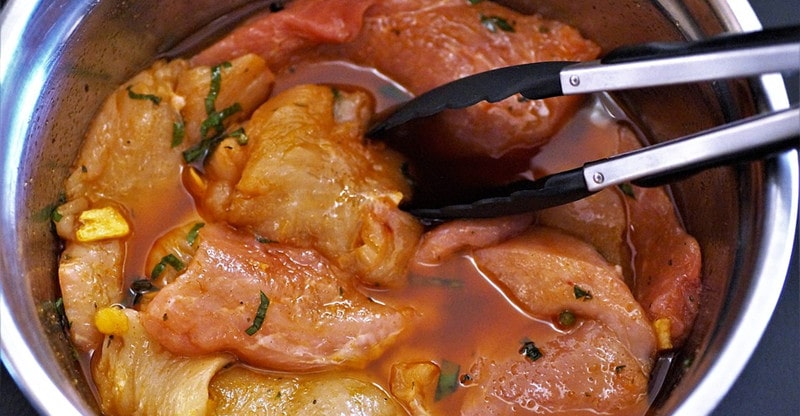How to marinate steaks, pork, and other meats
Looking for a great way to add flavor to steaks, pork chops, chicken, and more? We’ll show you how to tenderize meat with marinades and rubs.
Will your family be happy when you announce your intention to put another piece of meat on the grill at a family gathering? Maybe you need to season it slightly! Applying the final sauce at the end of cooking can make a big difference, but the way to get a real flavor impact while improving the texture and tenderness of the meat is to apply a marinade or rub before cooking begins.
Marinades and rubs are rarely used together, and the two techniques are completely different. For the uninitiated, one is wet and the other is dry. In the first part of a two-part series, we’ll get your feet and meat wet and dive into the delicious world of marinades.
A marinade is a brine in which a salt and sugar solution (sometimes with spices) is used to soak a whole chicken, turkey, or piece of meat to add deep moisture. The marinade usually consists of an acid (such as citrus juice, vinegar, wine, or yoghurt) to penetrate and tenderize the meat, the fat for flavor and moisture, and the spices for flavor. It is used for a shorter time and is more of surface treatment; you usually do not get more than a quarter-inch of penetration.
Basic marinade
One part oil: don’t use expensive extra virgin olive oil; use regular “pure” olive oil or other neutral oils such as grapeseed, rapeseed, or sunflower.
One part acid: fresh lemon or lime juice is great (lemon for Mediterranean flavors; lime for Latin or Asian flavors). Vinegar is generally too pungent, but can be used as part of the acid portion; balsamic vinegar (not really vinegar) adds depth and sweetness. Wine is an excellent choice for most meats. Note also that in India and the Middle East, plain yogurt is often used as a fat and acid.
Seasonings: Aromatics such as garlic, ginger, spices, and fresh herbs are always good; choose flavors that complement your meal. A little salt is fine, but soy sauce will add depth and freshness. Sugar will enhance browning and some say tenderness …… but if you’re grilling, don’t use too much as the sugar will burn. Worcestershire sauce is the perfect complement to beef and a little bourbon or brandy will add a little flavor.
Plan ahead: Many grill masters like to let their steaks marinate overnight or start them in the morning so they can enjoy them at dinner time. However, others warn that you should only marinate for thirty minutes to two hours, as the food will become mushy. Generally, very tough cuts of beef like round steaks need extra marinade time; brisket or flat iron steaks do not.
Pour the marinade over the meat in a glass baking dish (do not use a metal bowl, it reacts unpleasantly with the acid). Cover with cling film and refrigerate until ready to cook. Turn once halfway through if you have time.
You can use the marinade as a seasoning on the grill, but always discard the marinade when you are finished cooking; do not apply it to cooked food unless you have boiled it for at least three minutes.
How to marinate steak
Marinades are ideal for leaner cuts that need extra moisture or harder cuts that need to be tenderized. You wouldn’t want to marinate a quality cut of meat like filet mignon or rib eye, especially a quality aged beef that is already delicious. But for classic barbecue cuts like flank steak or hanger steak, a marinade can turn an otherwise chewy cut into something delicious.
Using the basic marinade pattern above, try the following steak flavor options.
Classic: oil, red wine, soy sauce, Worcestershire sauce, black pepper
Fajita-Style: oil, lime juice, garlic, paprika, cumin, oregano, coriander
Chimichurri: oil, lemon juice, garlic, parsley (lots of it)
Asian: oil, soy sauce, rice vinegar, garlic, ginger, five-spice powder, sesame oil, sugar
Pork chop marinade
Pork is particularly good for marinating as it lacks the intramuscular fat (marbling) of beef. While you wouldn’t normally marinate a fine beef tenderloin (strip) or loin (filet mignon) steak, use a marinade to make lean pork tenderloins and loin juicier and flavourful.
Using a basic marinade pattern, try these variations on restaurant-quality pork chops.
Classic: oil, red or white wine, garlic, Dijon mustard, rosemary, sage
Porketta (porketta): oil, white wine, garlic, crushed fennel seeds
Barbecue: oil, apple cider vinegar, mustard, onion, paprika, chili powder
Grilled chicken marinade
Chicken is the perfect canvas for any barbecue artist and loves almost any marinade …… including most marinades used for pork. Skinless chicken – especially lean chicken breasts – needs to be oiled throughout and you may want to increase the oil content.
Use the basic marinade pattern above (with the option to increase the oil) to enhance your chicken with these.
Asian: oil, soy sauce, rice vinegar, garlic, ginger, chili paste, sesame oil, sugar
Greek: olive oil, lemon juice, garlic, oregano, black pepper
Italian Diavolo: oil, lemon juice, garlic, lots of black pepper and/or red pepper flakes, rosemary
Indian: yoghurt, lime juice, ginger, garlic, curry powder or Indian curry powder, coriander
Lamb shank recipe
Roast leg of lamb is as traditional as in Greece, Italy, and other parts of the Mediterranean. To roast it (so it marinates more thoroughly) you may want to butterfly the roast lengthways, remove the bones (if there are any), open it up and pour the marinade over it. Or if you are going to roast it on the bone, thicken the marinade: use more garlic, mash it together with the herbs, and pound it to a paste with a mortar and pestle, using very little oil and liquid.
Italian: olive oil, lemon juice, garlic, rosemary, black pepper
Greek: olive oil, lemon juice, garlic, oregano, black pepper
Middle Eastern: olive oil, lemon juice, garlic, mint, black pepper
Used in almost every cuisine on the planet, marinades are a wonderful way to add flavor and mouth-watering tenderness to standard cuts of meat. Next, we’ll show you dry rubs for ribs and any meat you can imagine. Happy grilling!
5 condiments for top marinades
1. Red wine.
Red wine is our first choice as its pairing with steak is legendary! The acidity and herbal aftertaste of the wine will enhance your choice and give it a luxurious feel. The following are the ingredients needed for a red wine marinade.
250 ml red wine
190 ml olive oil
5 cloves of minced garlic
2 tablespoons of diced onion
2 – 3 sprigs of fresh rosemary
1 tablespoon lemon juice
1 teaspoon sea salt
1 teaspoon pepper
Once you have gathered all the ingredients for this marinade, place them all in a zip lock bag and seal them up. Refrigerate the bag for at least 4 to 6 hours for best results. Be sure to turn the bag over every hour or so to allow the marinade to soak in evenly. 2.
2. Teriyaki and soy sauce.
This marinade is for those who want to change things up from the classics. Grab your bottle of teriyaki and soy sauce so you can savor your favorite steak with these wonderful condiments! Here’s what you’ll need for the marinade.

1/3 cup soy sauce/teriyaki sauce
3 tablespoons Worcestershire sauce
1 tablespoon balsamic vinegar
2 tablespoons vegetable oil
4 cloves of minced garlic
1 teaspoon sugar
A pinch of freshly ground pepper
Before you mix all the seasonings and spices, you should prepare the meat by poking it with a fork. This essentially creates pathways for the flavors to seep into the meat’s structure.
Once you have pricked the meat, place it in a self-sealing bag and soak it with all the other ingredients. Seal the bag and place it in a safe corner of the fridge for 4-6 hours, then turn it when you feel it becoming unbalanced. When the time is up, you should take the steak out and pat the marinade dry.
3. Vinegar.
The vinegar bath is what you want in case you don’t want the marinade to ruin the sauce. The vinegar itself doesn’t have much flavor, so of course, it leaves room for other flavors to penetrate. Nonetheless, it is still acidic enough to make raw meat tear apart with a simple fork.
For this reason, you can simply soak the meat in the vinegar for a few hours. Use a bowl deep enough so that the meat can be completely submerged in the vinegar.
Quick note: you should not allow the vinegar to process the meat for more than 10 hours. This will cause all the water in the meat to be absorbed, making it drier and chewier than before. In this way, submerging the meat in vinegar is no different from cooking it.
4. Lime.
Lime is also another excellent choice for an acid tenderizer. Unlike vinegar, it can be mixed with other foods to make a Tex-Mex vibe marinade, rather than simply tenderizing the meat. Lime marinade will bring a fresh summer flavor to your overall meal and may even make your stomach feel less heavy!
This is the lime marinade you need.

1/4 cup freshly squeezed lime juice
2 tablespoons vegetable oil
2 tablespoons brown sugar
1 tablespoon Worcestershire sauce
3 teaspoons minced garlic
As before, you simply seal the meat and all the other ingredients in a Ziploc bag and place the whole mixture in the fridge. Turn it frequently to ensure that the flavors penetrate the meat in an even way.
You can soak the meat for 4-6 hours or even leave it overnight, but some people say that the lime juice only needs 2 hours to take effect. If you want to marinate meat on the go, a lime marinade is a wise choice!
5. Barbecue mix.
Korean-style barbecue is becoming increasingly popular. As well as being a tender and delicious cut, it offers such a fun dining experience. Any Korean barbecue meat is delicious thanks to this wonderful barbecue sauce.
Here’s what you need to make a great barbecue sauce.
1/4 cup soy sauce
1 tablespoon of sugar
2 teaspoons Asian sesame oil
1 bunch of minced shallots
1 tablespoon minced garlic
1 tablespoon minced peeled fresh ginger
3 tablespoons sesame seeds, toasted
1 tablespoon vegetable oil
You simply repeat the previous steps: place everything in a ziplock bag and leave it to stand. On the other hand, what makes the barbecue sauce so special is that 1) you don’t have to pat the meat dry before cooking and 2) you only have to let the meat soak for a maximum of 20 minutes. That’s how these KBBQ restaurants serve their customers so quickly! However, what if you have less time to make sure the meat is ready to grill? Try the following non-marinade technique!
What other ways are there to tenderize meat?
1. Salt.
This method is suitable for cuts of meat that are too thick to absorb the sauce effectively.
The way salt tenderizes your meat is that it draws moisture from the cut and replaces it with itself. The salt then relaxes the meat’s muscles, causing the overall structure to become weaker and more prone to tearing. The protein cells affected by the salt rub will also retain fat for longer, allowing the meat to remain juicy even after it has dried. Cover the meat completely with a generous amount of salt. You can choose to let it rest for 40-60 minutes, or rub the salt in your hands for faster results. Once the time is up, wash the meat carefully and dry it with paper towels.
If you want to add a little flavor to the rub, you can add some minced garlic to the mixture and let the salt season it for you.
2. Tenderising powder.
You need to do more than just sprinkle some powder on the meat to make it tasty and flavourful. Just like with salt, you can slowly rub the powder in, or poke the meat with a fork to get the powder in. Make sure you do this to both sides of the meat!
If you don’t let the tenderizing powder get into the cut, the surface will become mushy while the core will remain tough and chewy.
3. Meat Mallet.
When all else fails, you can turn to the meat mallet to get the job done. All you need to do is pound the meat on both sides and the meat will succumb.
Don’t be surprised when the meat flattens out as you pound it. It is best not to do this to a piece of meat that is already on the grill. A little scratching with a knife will suffice.
Conclusion
So, how do you tenderize meat with a marinade? – You can choose to tenderize the meat with the help of some of the marinades we have mentioned, such as red wine, soy sauce, teriyaki, vinegar, lime, grill mixtures, etc.
These are just some of the best methods you can use to tenderize and season the meat before it is heated. If you have other great tenderizing techniques, please let us know in the comments below!
The world of food is vast and beautiful, so don’t limit yourself to the methods you already know!
And some grilling tips
For best results, marinate the meat for 4-6 hours.
Remember that tender meat can be marinated for a shorter period.
To prevent food poisoning, discard the marinade when you remove the meat for grilling or roasting.
This is a very effective way to marinate beef, lamb chops and pork. I found this in my kitchen when I was cooking a barbecue for my family










